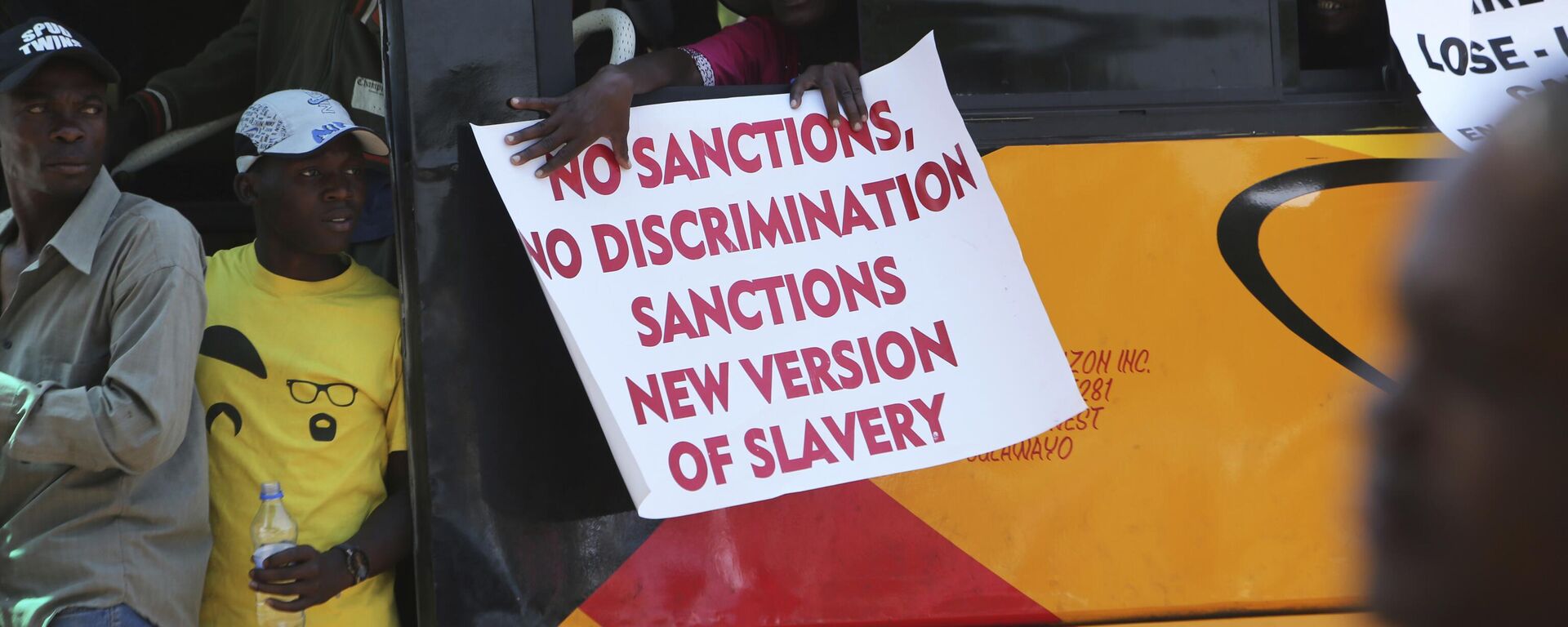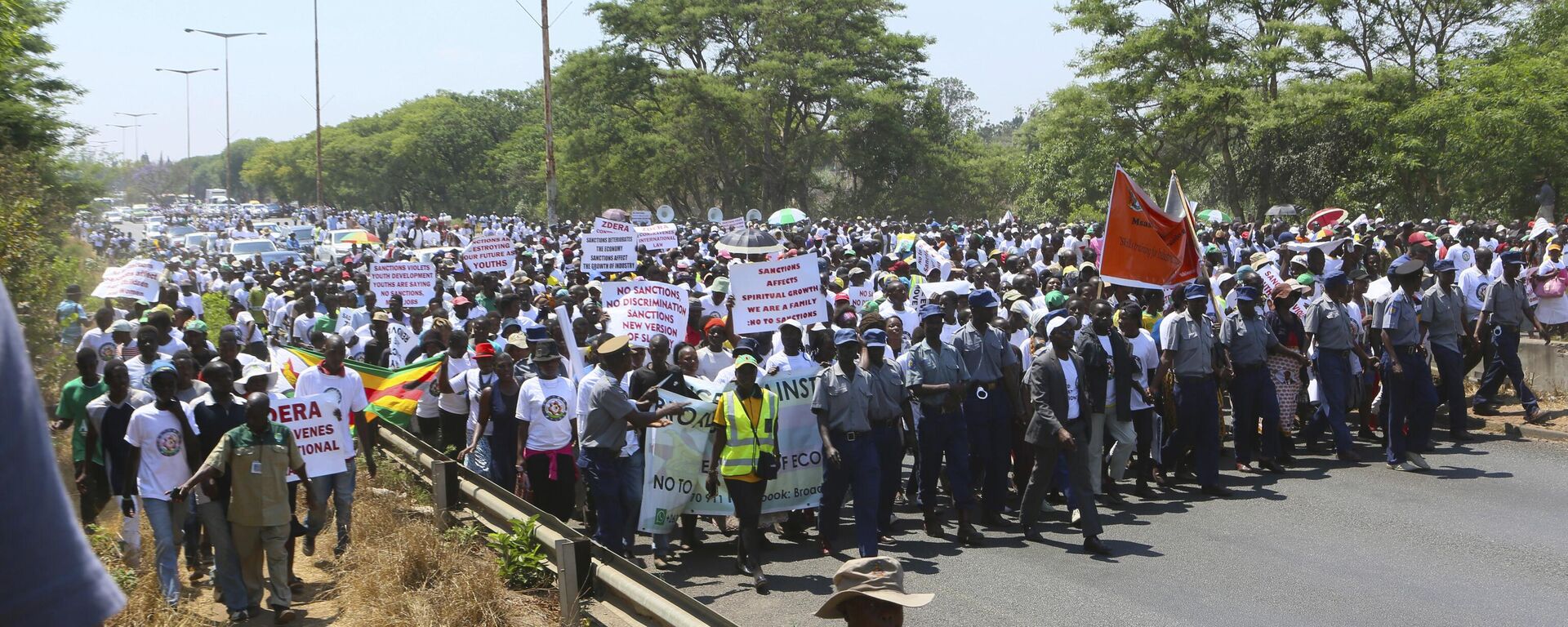https://en.sputniknews.africa/20231025/sanctions-on-zimbabwe-historical-perspective--contemporary-impact-1063069048.html
SADC Anti-Sanctions Day: How Did West Sanction Zimbabwe & What Is the Outcome?
SADC Anti-Sanctions Day: How Did West Sanction Zimbabwe & What Is the Outcome?
Sputnik Africa
Numerous nations, as well as international bodies such as the United Nations and the African Union, have repeatedly called for the lifting of the unilateral US... 25.10.2023, Sputnik Africa
2023-10-25T14:19+0200
2023-10-25T14:19+0200
2023-10-27T17:10+0200
sub-saharan africa
emmerson mnangagwa
zimbabwe
united states (us)
european union (eu)
southern africa development community (sadc)
sanctions
us sanctions
https://cdn1.img.sputniknews.africa/img/07e7/0a/19/1063069685_0:320:3072:2048_1920x0_80_0_0_46578240c614b24a3ff366bdbf67f2e5.jpg
On October 25, the Southern African Development Community (SADC) Anti-Sanctions Day is observed, a symbol of solidarity with Zimbabwe and a call for the lifting of sanctions imposed by some Western nations. The day was endorsed at the 39th SADC Summit in Dar es Salaam, Tanzania, in August 2019.In 2023, the day is observed under the theme "Harnessing the youth for accelerated socio-economic development in the fight against sanctions". According to a joint statement by the SADC group of ambassadors in Moscow, the theme "aptly resonates with the 43rd SADC Summit theme of 'Human and financial capital: the key drivers for sustainable industrialisation of the SADC Region.'"In 2001 and 2002, the United States and the European Union respectively imposed sanctions on Zimbabwe, citing alleged human rights violations and a lack of democracy, following one of the rounds of Zimbabwe's Land Reform Program in 2000.The Land Reform Program was initiated in 1980, following the signing of the Lancaster House Agreement, with the aim of redistributing land more equitably between black subsistence farmers and the white minority of European ancestry.By addressing historical disparities in land ownership, the program sought to create a more balanced ethnic landscape. However, the implementation of the program faced critique from Western countries due to reported violence and intimidation during land expropriations.Targets of the SanctionsThe sanctions primarily target individuals and entities associated with the ruling party, encompassing travel bans, asset freezes, and an arms embargo.Currently, US sanctions target 85 individuals, including President Emmerson Mnangagwa, as well as 56 companies and organizations facing restrictions. Meanwhile, EU sanctions specifically aim at individuals within the Zimbabwean government and its affiliates, entailing travel limitations, asset freezes, and an embargo on the sale of military hardware and equipment.Although initially imposed during the era of former President Robert Mugabe, Zimbabwe's first and longtime president since the country's independence in April 1980, both the US and EU sanctions are extended every year as of the present time, despite a change in leadership from Mugabe to Emmerson Mnangagwa in 2017.Speaking about the sanctions, the US Department of State has reiterated its "commitment to act in support of a transparent and prosperous Zimbabwe" and noted that the restricive measures "do not target the Zimbabwean people, the country of Zimbabwe, or Zimbabwe’s banking sector".The ImpactThe US and EU maintain that these unilateral restrictions have no direct impact on the country's economy because they target specific Zimbabwean entities and government officials, including the country's president.Ordinary Zimbabweans, in their turn, have been complaining about the negative impact of sanctions on them for 22 years. According to the SADC and the UN, the restrictive measures have affected access to basic necessities such as food, water, health care, education and employment; the grave economic situation fueled corruption and informal trade.As stressed in a SADC report, Zimbabwe "lost well over US$42 billion in revenue" in 2001-2020 because of the sanctions.According to local anti-sanctions activists, the human rights violated by the Western sanctions against the country include the right to life, the right to food, the right to health, the right to development, the right to education, and economic and cultural rights.Calls for Lifting 'Illegal' SanctionsMany countries around the world, as well as international bodies and human rights organizations, have called for the lifting of the "illegal" unilateral US and EU sanctions against Zimbabwe.The SADC deems the US and EU sanctions against Zimbabwe "illegal and unjustified" for violating Article 41 of the United Nations Charter, which states that sanctions can only be decided on by the UN Security Council.Apart from SADC, the African Union and the United Nations have repeatedly called on Western countries to lift their targeted sanctions from Zimbabwe.In October 2022, the UN Special Rapporteur on unilateral coercive measures has called for the lifting of unilateral sanctions against Zimbabwe and urged meaningful structured dialogue on political reform, human rights, and the rule of law in the Southern African country.
https://en.sputniknews.africa/20231025/sadc-au-calling-for-lifting-of-sanctions-against-zimbabwe-on-anti-sanctions-day-1063061728.html
https://en.sputniknews.africa/20230621/zimbabwean-sanctions-fighter-tells-us-youre-times-up-youre-bullyings-up-1060050175.html
https://en.sputniknews.africa/20230608/defending-our-country-zimbabwean-civil-rights-group-petitions-us-over-sanctions-1059786648.html
zimbabwe
united states (us)
Sputnik Africa
feedback@sputniknews.com
+74956456601
MIA „Rossiya Segodnya“
2023
Muhammad Nooh Osman
https://cdn1.img.sputniknews.africa/img/07e7/04/0a/1058467512_0:0:1280:1280_100x100_80_0_0_ec723833bcbfcaed2e21952965ad99e4.jpg
Muhammad Nooh Osman
https://cdn1.img.sputniknews.africa/img/07e7/04/0a/1058467512_0:0:1280:1280_100x100_80_0_0_ec723833bcbfcaed2e21952965ad99e4.jpg
News
en_EN
Sputnik Africa
feedback@sputniknews.com
+74956456601
MIA „Rossiya Segodnya“
Sputnik Africa
feedback@sputniknews.com
+74956456601
MIA „Rossiya Segodnya“
Muhammad Nooh Osman
https://cdn1.img.sputniknews.africa/img/07e7/04/0a/1058467512_0:0:1280:1280_100x100_80_0_0_ec723833bcbfcaed2e21952965ad99e4.jpg
emmerson mnangagwa, zimbabwe, united states (us), european union (eu), southern africa development community (sadc), sanctions, us sanctions
emmerson mnangagwa, zimbabwe, united states (us), european union (eu), southern africa development community (sadc), sanctions, us sanctions
SADC Anti-Sanctions Day: How Did West Sanction Zimbabwe & What Is the Outcome?
14:19 25.10.2023 (Updated: 17:10 27.10.2023) Muhammad Nooh Osman
Writer/Editor
Numerous nations, as well as international bodies such as the United Nations and the African Union, have repeatedly called for the lifting of the unilateral US and EU sanctions against Zimbabwe, citing the destructive impact of the restrictive measures on the country's economy.
On October 25, the Southern African Development Community (SADC) Anti-Sanctions Day is observed, a symbol of solidarity with Zimbabwe and a call for the lifting of sanctions imposed by some Western nations. The day was endorsed at the 39th SADC Summit in Dar es Salaam, Tanzania, in August 2019.
In 2023, the day is observed under the theme "Harnessing the youth for accelerated socio-economic development in the fight against sanctions". According to a joint statement by the SADC group of ambassadors in Moscow, the theme "aptly resonates with the 43rd SADC Summit theme of 'Human and financial capital: the key drivers for sustainable industrialisation of the SADC Region.'"
"The two themes inspire human resources, particularly the young of the future, to preserve resilience and fortitude in the face of illegal sanctions," the statement reads.
In 2001 and 2002, the United States and the European Union respectively imposed
sanctions on Zimbabwe, citing alleged human rights violations and a lack of democracy, following one of the rounds of Zimbabwe's Land Reform Program in 2000.
The Land Reform Program was initiated in 1980, following the signing of the Lancaster House Agreement, with the aim of redistributing land more equitably between black subsistence farmers and the white minority of European ancestry.
By addressing historical disparities in land ownership, the program sought to create a more balanced ethnic landscape. However, the implementation of the program faced critique from Western countries due to reported violence and intimidation during land expropriations.
The sanctions primarily target individuals and entities associated with the ruling party, encompassing travel bans, asset freezes, and an arms embargo.
Currently, US sanctions target 85 individuals, including President Emmerson Mnangagwa, as well as 56 companies and organizations facing restrictions. Meanwhile, EU sanctions specifically aim at individuals within the Zimbabwean government and its affiliates, entailing travel limitations, asset freezes, and an embargo on the sale of military hardware and equipment.
Although initially imposed during the era of former President Robert Mugabe, Zimbabwe's first and longtime president since the country's independence in April 1980, both the US and EU sanctions are extended every year as of the present time, despite a change in leadership from Mugabe to
Emmerson Mnangagwa in 2017.
Speaking about the sanctions, the US Department of State has reiterated its "commitment to act in support of a transparent and prosperous Zimbabwe" and noted that the restricive measures "do not target the Zimbabwean people, the country of Zimbabwe, or Zimbabwe’s banking sector".
President Emmerson Mnangagwa, however, has noted that the real purpose of the sanctions is to weaken Zimbabwe's economy and to turn citizens against the government led by the ZANU-PF party.
The US and EU maintain that these unilateral restrictions have no direct impact on the country's economy because they target specific Zimbabwean entities and government officials, including the country's president.
Ordinary Zimbabweans, in their turn, have been complaining about the negative impact of sanctions on them for 22 years.
According to the SADC and the
UN, the restrictive measures have affected access to basic necessities such as food, water, health care, education and employment; the grave economic situation fueled corruption and informal trade.
As stressed in a SADC
report, Zimbabwe "lost well over US$42 billion in revenue" in 2001-2020 because of the sanctions.
Evaluating the impact of the sanctions, the country's Ministry of Foreign Affairs and International Trade noted that "pre-sanctions era, loan inflows to Zimbabwean companies increased from USD$134 million in 1980 to US$480 million in the 1990s but fell significantly to an average of US$80 million between 2000 and 2008."
According to local anti-sanctions activists, the human rights violated by the Western sanctions against the country include the right to life, the right to food, the right to health, the right to development, the right to education, and economic and cultural rights.
"They are saying there are no sanctions in Zimbabwe, they are saying these sanctions are just targeted at a few people, our few leaders," explained Martin Zharare, the executive director of Citizens Against Economic Sanctions (CAES), a local organization that advocates for the lifting of restrictions to ease the burden on the Zimbabwean people. "But when we did serious research, we discovered it was very serious misinformation. These sanctions are economic, these sanctions that are on our government, these sanctions are on our economy."
Calls for Lifting 'Illegal' Sanctions
Many countries around the world, as well as international bodies and human rights organizations, have called for the lifting of the
"illegal" unilateral US and EU sanctions against Zimbabwe.
"It is now over twenty years since the imposition of these targeted sanctions – two decades marred by the inability of the people of Zimbabwe to fully achieve their potentials across various sectors as a nation," SADC said on Wednesday. "The extent of this block to Zimbabwe’s socio-economic growth on the livelihood of its people represents a modern-day atrocity which we, as the SADC Family, strongly feel is an impediment that leaves one of our Members behind from our common quest for regional integration, growth and prosperity."
The SADC deems the US and EU sanctions against Zimbabwe "illegal and unjustified" for violating Article 41 of the United Nations Charter, which states that sanctions can only be decided on by the UN Security Council.
Apart from SADC, the African Union and the United Nations have repeatedly called on Western countries to lift their targeted sanctions from Zimbabwe.
In October 2022, the UN Special Rapporteur on unilateral coercive measures has called for the lifting of unilateral sanctions against Zimbabwe and urged meaningful structured dialogue on political reform, human rights, and the rule of law in the Southern African country.




